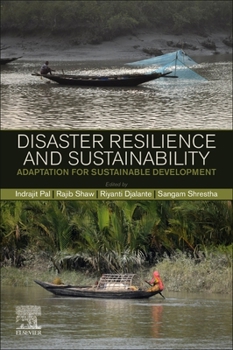Disaster Resilience and Sustainability: Adaptation for Sustainable Development
Disasters undermine societal well-being, causing loss of lives and damage to social and economic infrastructures. Disaster resilience is central to achieving the 2030 Sustainable Development Goals, especially in regions where extreme inequality combines with the increasing frequency and intensity of natural disasters.
Disaster risk reduction and resilience requires participation of wide array of stakeholders ranging from academicians to policy makers to disaster managers. Disaster Resilient Cities: Adaptation for Sustainable Development offers evidence-based, problem-solving techniques from social, natural, engineering and other disciplinary perspectives. It connects data, research, conceptual work with practical cases on disaster risk management, capturing the multi-sectoral aspects of disaster resilience, adaptation strategy and sustainability. The book links disaster risk management with sustainable development under a common umbrella, showing that effective disaster resilience strategies and practices lead to achieving broader sustainable development goals.





